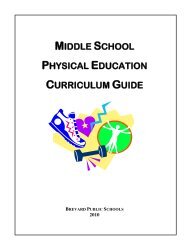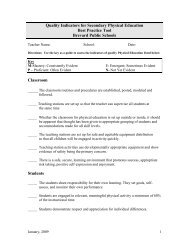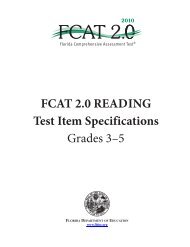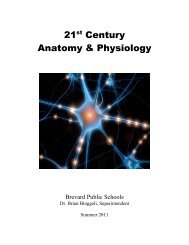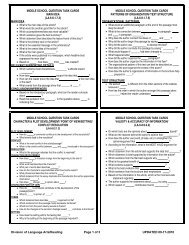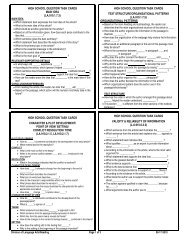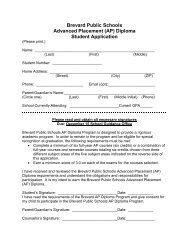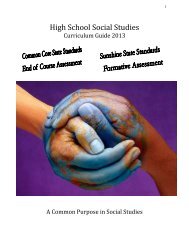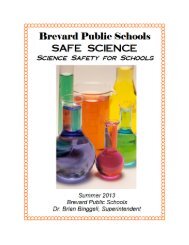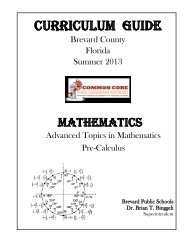Science Research Program Guide - Secondary Programs Home ...
Science Research Program Guide - Secondary Programs Home ...
Science Research Program Guide - Secondary Programs Home ...
You also want an ePaper? Increase the reach of your titles
YUMPU automatically turns print PDFs into web optimized ePapers that Google loves.
A. Additional Rules for Projects Involving Unknown<br />
Microorganisms<br />
Studies involving unknown microorganisms present a challenge<br />
because the presence, concentration and pathogenicity of<br />
possible agents are unknown. In science fair projects these<br />
studies typically involve the collection and culturing of<br />
microorganisms from the environment (e.g. soil, household<br />
surfaces, skin, etc.)<br />
1) <strong>Research</strong> with unknown microorganisms can be treated as a<br />
BSL-1 study under the following conditions:<br />
a) Organism is cultured in a plastic Petri dish (or other<br />
standard non-breakable container) and sealed. Other<br />
acceptable containment include petri film and doubled<br />
heavy-duty (2-ply) sealed bags.<br />
b) Experiment involves only procedures in which the Petri dish<br />
remains sealed throughout the experiment (i.e. counting<br />
presence of organisms or colonies).<br />
c) The sealed Petri dish is disposed of in the appropriate<br />
manner under the supervision of the Designated Supervisor.<br />
2) If a culture is opened for identification, sub-culturing or<br />
isolation, it must be treated as a BSL-2 study and involve BSL-<br />
2 laboratory procedures.<br />
B. Additional Rules for Projects Involving<br />
Recombinant DNA (rDNA) Technologies<br />
Studies involving rDNA technologies in which microorganisms<br />
have been genetically modified require close review to assess risk<br />
level assignment. There are a few rDNA studies that can be<br />
safely conducted in a BSL-1 high school laboratory with prior<br />
review by a knowledgeable SRC.<br />
1) All rDNA technology studies involving BSL-1 organisms and<br />
BSL-1 host vector systems may be conducted in a BSL-1<br />
laboratory under the supervision of a Qualified Scientist or<br />
trained Designated Supervisor and must be approved by the<br />
SRC prior to experimentation. Examples include cloning of<br />
DNA in E. coli K12, S. cerevesiae, and B. subtilis host-vector<br />
systems.<br />
2) Commercially available rDNA kits using BSL-1 organisms may<br />
be conducted in a BSL-1 laboratory under the supervision of a<br />
qualified scientist or trained designated supervisor and must<br />
be approved by the SRC prior to experimentation.<br />
3) A rDNA technology study that involves BSL-1 agents that<br />
may convert to BSL-2 agents during the course of<br />
experimentation must be conducted entirely in a BSL-2 facility.<br />
4) All rDNA technology studies involving BSL-2 organisms and/<br />
or BSL-2 host vector systems must be conducted in a<br />
regulated research institution and approved by the IBC prior<br />
to experimentation.<br />
5) Propagation of recombinants containing DNA coding for<br />
oncogenes or other human, plant or animal toxins (including<br />
viruses) are prohibited.<br />
C. Additional Rules for Projects Involving Tissues &<br />
Body Fluids, including Blood and Blood Products<br />
Studies involving fresh/frozen tissue, blood or body fluids<br />
obtained from humans and/or vertebrate may contain<br />
microorganisms and have the potential of causing disease.<br />
Therefore, a proper risk assessment is required.<br />
1) If tissues are obtained from an animal that was sacrificed for a<br />
purpose other than the students’ project, it may be considered<br />
a tissue study. Documentation of the IACUC approval for the<br />
original animal study from which tissues are obtained is<br />
required.<br />
2) If the animal was euthanized solely for the student’s project,<br />
the study must be considered a vertebrate animal project and<br />
adhere to the vertebrate animal rules for studies conducted at a<br />
regulated research institution. (See vertebrate animal rules, pg<br />
17.)<br />
3) Biosafety level 1 studies involve the collection and examination<br />
of fresh/frozen tissue and/or body fluids, (not including blood<br />
or blood products, see rule 5) from a non-infectious source with<br />
little likelihood of microorganisms present. Biosafety level 1<br />
studies can be conducted in a BSL-1 laboratory and must be<br />
supervised by a Qualified Scientist or trained Designated<br />
Supervisor.<br />
4) Biosafety level 2 studies involve the collection and examination<br />
of fresh/frozen tissues or body fluids that may contain<br />
microorganisms belonging to BSL-1 or 2. These studies must<br />
be conducted in a regulated research institution under the<br />
supervision of a Qualified Scientist.<br />
5) All studies involving human or wild animal blood or blood<br />
products should be considered a Biosafety level 2 study and<br />
must be conducted in a BSL-2 laboratory under the supervision<br />
of a Qualified Scientist. All studies involving domestic animal<br />
blood may be considered a BSL-1 level study. All blood must<br />
be handled in accordance with standards and guidelines set<br />
forth in the OSHA, 29CFR, Subpart Z. Any tissue or<br />
instruments with the potential of containing bloodborne<br />
pathogens (eg. blood, blood products, tissues that release<br />
blood when compressed, blood contaminated instruments)<br />
must be properly disposed of after experimentation.<br />
6) Human breast milk of unknown origin, unless certified free of<br />
HIV and Hepatitis C and domestic unpasteurized animal milk are<br />
considered BSL-2. Pasteurized domestic animal milk may be<br />
considered BSL-1.<br />
7) Any study involving the collection and examination of body<br />
fluids which may contain biological agents belonging to BSL-3<br />
or 4 is prohibited for precollege students.<br />
8) Studies of human body fluids, where the sample can be<br />
identified with a specific person, must have IRB review and<br />
informed consent. Students using their own body fluids are<br />
exempt from this requirement.<br />
9) Studies involving human embryonic human stem cells must be<br />
conducted in a registered research institution and reviewed<br />
and approved by the ESCRO (Embryonic Stem Cell <strong>Research</strong><br />
Oversight) Committee.<br />
Page 22 International Rules for Precollege <strong>Science</strong> <strong>Research</strong>: <strong>Guide</strong>lines for <strong>Science</strong> and Engineering Fairs / 2008-2009



